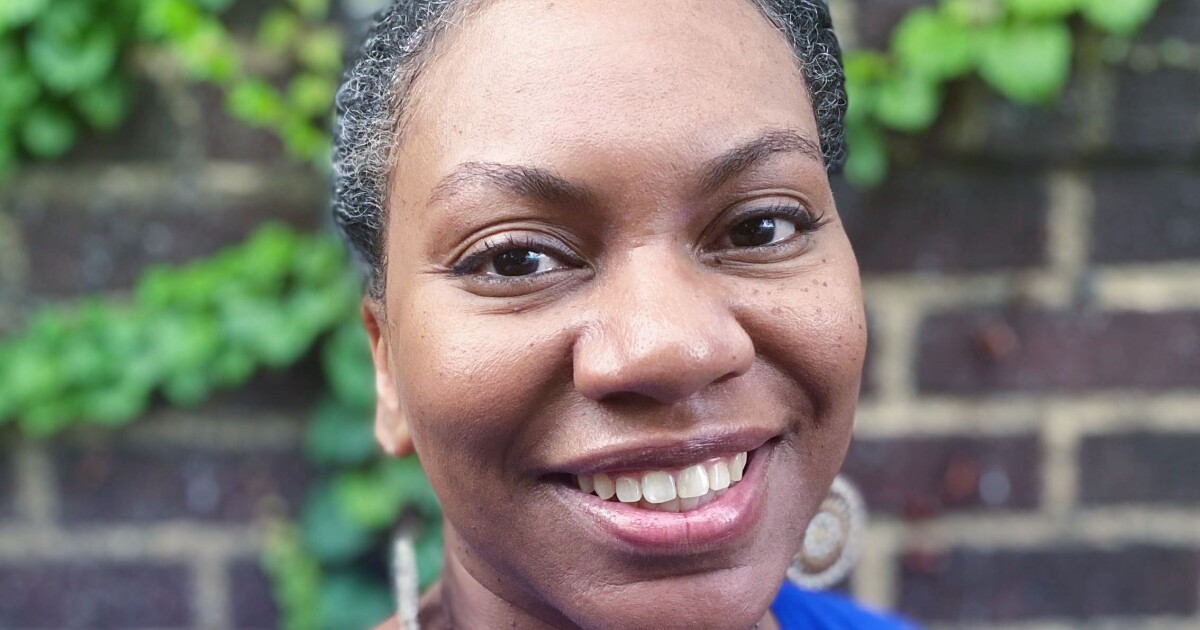This is WESA Arts, a weekly newsletter by Bill O’Driscoll providing in-depth reporting about the Pittsburgh area art scene. Sign up here to get it every Wednesday afternoon.
Tahirah J. Walker grew up in Newark, N.J., and got her bachelor’s degree at Sarah Lawrence College. But she says living in Pittsburgh for the past 25 years as a Black woman “has almost been getting a degree in itself.”
Walker shares what’s she’s learned in a new book, and at two talks this week, on Thu., Oct. 16, at Pittsburgh Arts & Lectures and Sat., Oct. 18, at City of Asylum’s LitFest (the latter in conversation with poet Yona Harvey and author Damon Young).
Her book, which grew out of Walker’s doctoral dissertation at Duquesne University, has the somewhat academic title “Rhetoric, Intersectionality, and Black Women in Pittsburgh.” But it companionably borrows its subtitle, “Living Enough for the City,” from a Stevie Wonder lyric. It’s also peppered with memoir, unusually personal for a title on the Bloomsbury Academic imprint.
And its key message is that Black women in Pittsburgh have long been marginalized in multiple ways: as Black people, as women, often as lower-income folks, and sometimes as transgender people as well.
As someone who’s raised three daughters here, Walker says, “The stakes of talking about Black womanhood, and what some of the things are that we should be paying attention to, are very high for me.”
Walker, who’s served on the faculties of Pitt, Penn State and Bethany College, currently teaches at Point Park University and chairs its Department of Community Engagement & Leadership.
One touchstone for her new book is the 2019 Pitt School of Social Work report “Pittsburgh’s Inequality Across Gender and Race.” The widely publicized report concluded that based on broad measures of health, employment and educational opportunities, Pittsburgh might be the worst city for Black women in the whole country.
Walker’s writing is to some degree an effort to ascertain just why that might be, especially in a city with well-funded foundations, big universities and a vast health care infrastructure.
She suspects the problem lies not in the nature or extent of our resources but in who’s wielding them.
“Where do you see Black women in leadership? Where do you see them in roles where they can set the tone for the organization?” she says. “The answer to that too often was, nowhere. Not one person at a table where decisions were being made.”
Walker adds, “A lot of what I had written about in the [dissertation] was the ways that Black women in particular are constantly in this situation of having to ask that there be nothing about us without us.”
A related question is why, given the broad influence Black Pittsburghers have had on American culture — from the once nationally distributed Pittsburgh Courier newspaper and jazz legends like Billy Strayhorn to pioneering cartoonist Jackie Ormes, 20th-century suffragist Daisy Lampkin and Pulitzer-winning playwright August Wilson — Pittsburgh isn’t seen as more of a “Black” city.
Along the way, Walker tells personal stories about everything from coming out to her mother to confronting racism in academia. She also explores silence — both as imposed on marginalized people and as chosen by them as a survival strategy — and the practice of “parrhesia,” or speaking truth to power, by Black women from scholars to activists.
Even at a time when forces from the White House on down are trying to quash diversity, equity and inclusion efforts and to erase Black history, Walker says, there is reason to be hopeful. In her book, she cites tactics ranging from hashtag movements (like #MeToo, launched by Black activist Tarana Burke) to coalition-building around issues of shared relevance.
Walker notes that Black women have long built winning coalitions in the region, including the parents whose civil-rights lawsuit led to the creation in 1982 of the desegregated Woodland Hills School District. And she cites more recent victories by Black women from southwestern Pennsylvania, including state Rep. La’Tasha Mayes – the first out lesbian state legislator in commonwealth history – and U.S. Rep. Summer Lee, the first Black woman to represent Pennsylvania in Washington.
Still, Walker notes that “Black women” are not a monolithic group, and differ widely in their interests, education, family and work lives. And she cautions that Black trans women, like activists Ciora Thomas and Deena Stanley, are too often left out of conversations about Black women here.
Overall, does Walker think change for the better is happening?
“I am, if nothing else, an optimist,” she says. “So my answer to that question is always emphatically yes.”

